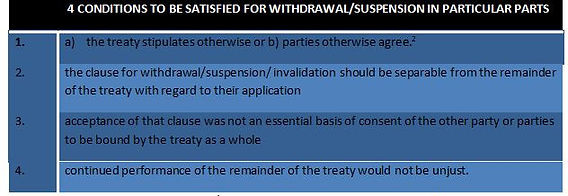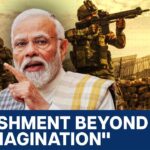By Dr. Gyan Pathak
It is perhaps the worst of time. In an act of terror at Pahalgam in Jammu and Kashmir, 26 people were killed, the worst in the last 25 years since 2000. The world called it ‘An Act of Terror’. Prima facie evidence of Pakistan’s involvement in this terror attack prompted India to immediately take five stringent actions against Pakistan. One of them was suspension of Indus Waters Treaty of 1960. Pakistan called the suspension ‘An Act of War’ and then suspended Simla Agreement of 1972, which amounts to ‘A Suspension of Peace’. UN calls for ‘maximum restraint’. The tale is in progress and nobody exactly knows which way it would turn.
In its initial reaction Pakistan on Wednesday said it was “concerned at the loss of tourists’ lives” in the terrorist attack that took place on Tuesday, April 22. Then Pakistan’s Defence Minister Khwaja Asif claimed that country has nothing to do with the incident. And Indian officials, however, were not convinced by Pakistan’s denial.
Nevertheless, Pakistan’s Deputy Prime Minister and Foreign Minister Ishaq Dal called the Pahalgam terrorists “freedom fighters”. Even Pakistan resorted to exchange of fire in the Indo-Pak border in Jammu and Kashmir which was responded to promptly by Indian forces. The tale is in progress in ominous direction that will impact the common people of both the countries to the loss of their lives and properties.
The April 22, 2025 terror attack in Pahalgam has just exploded the myth created by the PM Narendra Modi’s propaganda machine that “all is well” in Jammu and Kashmir after the abrogation of the Article 370 of the Constitution of India, and splitting the state into to Union Territories making then under direct security cover of India against terrorism. Jammu and Kashmir was not actually safe from terrorists, since the terror groups were just keeping themselves low while PM Modi and Home Minister Amit Shah kept on boasting that they had restored peace in the valley after the strong security cover that was provided for the citizens. The valley has actually not seen death in an attack on civilians at this scale since October 2001 when 35 people were killed. Pulwama attack of 2019 was on armed forces in which over 40 personnels were killed.
Domestic security failure is proved, and hence peace in the valley under PM Narendra Modi, was simply a myth, a creation of his hyper propaganda machine. Then there is a cover up available for this failure, in the form of Pakistan’s hand in the current terror attack, and their traditional involvement in separatist and terrorist movements in the valley as well as in India. But this external hand, can’t absolve Modi government’s failure in the security front.
However, the tale progressed further, with the suspension of the Indus Water Treaty 1960, which survived even the three wars between India and Pakistan – in 1965, in 1971, and in 1999. Suspension of Indus Water Treaty now is a departure from the past, and one of the wars was fought under the BJP rule led by Atal Behari Vajpayee. PM Narendra Modi’s decision to suspend Indus Water Treaty is thus significant development.
Under the provision of the Indus Water Treaty – all the water of the Eastern Rivers of the Indus system – Sutlej, Beas, and Ravi – shall be available for the “unrestricted use” of India, while Pakistan shall receive water from the “Western Rivers” – Indus, Jhelum, and Chenab. With suspension of this treaty, Pakistan will suffer from an unprecedented level of water crisis, and also floods. It would be devastating for Pakistani people and all forms of life downstream. With point of view of humanity, the devastation would be unprecedented.
Had the Political and Military leadership in Pakistan not commented rashly on the terror attack in Pahalgam, or had promised help in eliminating terror network in the valley, the tale would have progressed differently. In place of following peace, they adopted a path of retaliation. Pakistan termed suspension of Indus Water Treaty 1960 by India as “An Act of War”.
On Thursday, April 24, Pakistan announced suspension of the Indo-Pak Simla Agreement 1972, which was an agreement for peace. Pakistan announced seven countermeasures in response to India’s measures against Pakistan. One of their seven countermeasures is the “Suspension of Peace” agreement that was signed between the two countries in the aftermath of 1971 war between the two that had led to creation of Bangladesh.
Simla Agreement was a significant milestone aimed at restoring peace and normalization of relations between the two countries, setting the tone for reconciliation by outlining the key principles a guide for future interaction for good relationship. Suspension of this agreement for peace will have grave implications, not only for the political and military leadership of both the countries but also for their people.
The joint statement on Shimla Agreement read, “The Government of India and the Government of Pakistan are resolved that the two countries put an end to the conflict and confrontation that have hitherto marred their relations and work for the promotion of a friendly and harmonious relationship and the establishment of durable peace in the sub-continent, so that both countries may henceforth devote their resources and energies to the pressing task of advancing the welfare of their people.” With suspension of this treaty by Pakistan, “advancing the welfare of” the people of both the countries has been put at grave risk.
After the suspension of the two International treaties by India and Pakistan, the pitch of jingoism on both sides is progressing towards its peak. Troops from Pakistan and India exchanged fire overnight on the border the line of control in the valley. In the meantime, the United Nations has urged both the countries “to exercise maximum restrained and to ensure that the situation and the developments we’ve seen do not deteriorate any further.” (IPA Service)

 Narendra Modi Has The Options To Teach Pakistan A Few Lessons Avoiding Military Strikes
Narendra Modi Has The Options To Teach Pakistan A Few Lessons Avoiding Military Strikes 